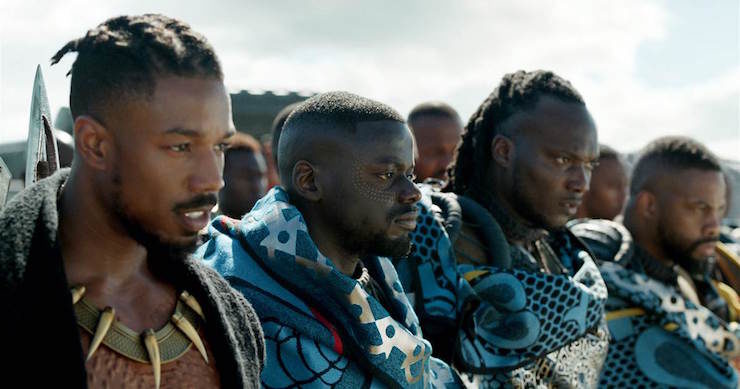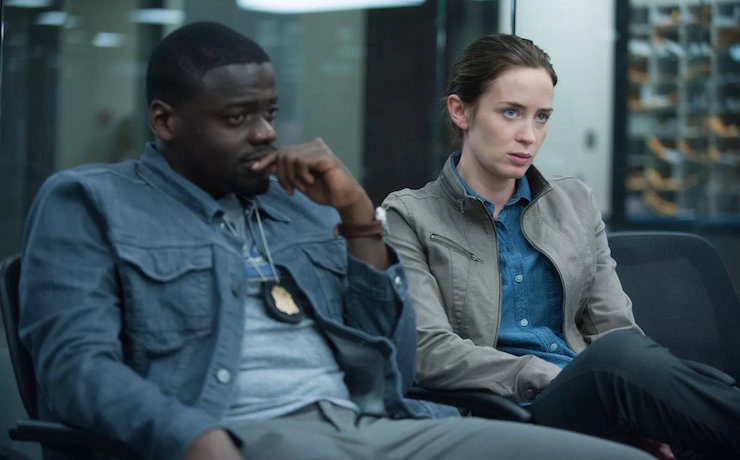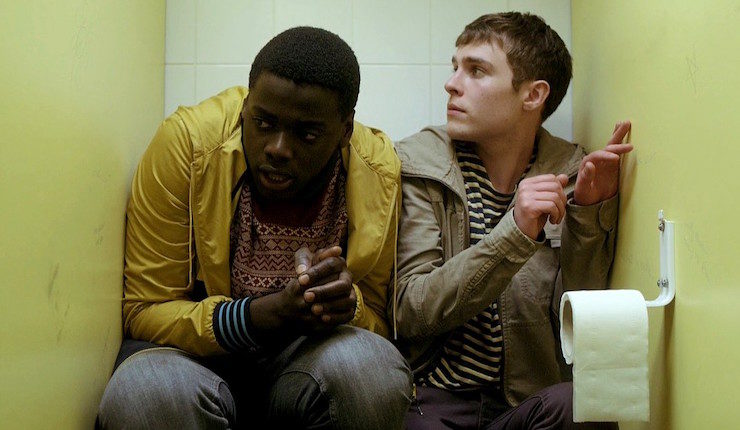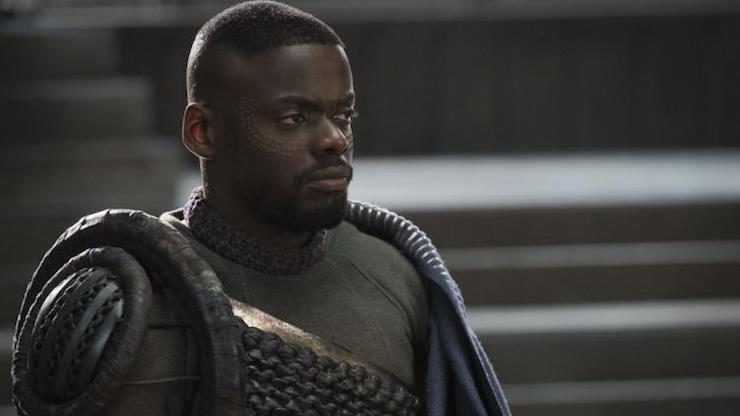Daniel Kaluuya is currently riding high in two of the best movies of the last 18 months. Oscar nominated and BAFTA winning for his turn as Chris in Get Out, he’s also a vital part of the Black Panther ensemble. In the hands of any other actor, either character would be a challenge. With Kaluuya inhabiting the roles, both soar.
Let’s start, of course, with Get Out. Chris Washington, played by Kaluuya, is the rock that his increasingly unsettling hosts break themselves against. For Missy, he’s a test case, for Jeremy a would-be opponent and for Dean and Rose? He’s just next. All of them see him as a commodity, none of them see him as human. The movie, and Kaluuya, use that to both throw the escalating horror into stark relief and to give Chris agency in ways that you never expect. The third act in particular is thick with symbolism and strewn with clever and meaningful nods to the horror genre, all leading up to an ending that remains the only time I’ve heard an entire audience audibly gasp with relief. If you want to dig in further, writer/director Jordan Peele himself responds to fan theories in this video, while this Buzzfeed piece is a surprisingly great overview, covering a lot of the movie’s symbolism and peeling back some fascinating layers.
W’kabi, Kaluuya’s role in Black Panther is less central but arguably just as vital. He provides the audience with a sense of Wakanda as a functioning country—one with unresolved problems in its past and looming questions in its near future, rather than the untouchable ideal that T’Challa initially sees it as. W’kabi is a friend, a dutiful soldier and diplomat, a good partner, and he is raising the cutest rhino in recent cinema history.

But he’s also a man defined by the same wounds as Killmonger. Killmonger loses his father to the Black Panther. W’kabi loses his father to the man that two successive Black Panthers have failed to bring to justice. The betrayal he feels, the pain, harmonizes with Killmonger’s in a way that makes his changing sides as natural and rational from his perspective as it is shocking to us.
Even then, deep in the war for Wakanda’s soul, W’kabi still clings to his principles. Faced off against his partner, Okoye, and her unswerving dedication to the country, he does the hardest possible right thing: he surrenders. It’s an act of extraordinary pragmatism and bravery, simultaneously, and it marks W’kabi out as one of the most interesting elements of Black Panther’s world. His place in the grey area between Killmonger and T’Challa, the tense space between the Wakandan border and the rest of the world, grounds the movie at the exact moment it most needs it and keeps it from slipping into chaos. The choice to throw down his weapons is the hardest thing he’s ever done and the only thing he can do, and Kaluuya shows us every thorny, painful moment of conflict in a performance that’s as quiet as it is powerful.
Kaluuya’s work in Denis Villeneuve’s moody crime thriller Sicario couldn’t be more different from his role as the conflicted W’kabi. When people talk about the movie they tend to focus on Emily Blunt, Benicio del Toro, and Josh Brolin. Sometimes, if you’re lucky, you’ll see some brief discussion of Maximiliano Hernández’s excellent turn in there, or a passing mention of the fact that Jeffrey Donovan and Jon Bernthal are in the cast. Kaluuya’s turn as Special Agent Reggie Wayne tends to get lost in the mix.

That’s a real shame, because Reggie is one of the movie’s most interesting characters. He’s the control—the stoic, dependable partner who sees what Blunt’s Kate Macer sees but reacts to it very differently. Whereas Macer is drawn into the shadowy, off-the-books conflict in the hopes of turning it into the righteous war she needs it to be, Reggie sees through it right from the start. The film cleverly uses the inherent racial tension of Wayne being the only black principle character to both isolate his viewpoint and contextualize that isolation. Kate, despite their partnership, is more easily drawn to the cheerfully amoral Special Forces sharks that Brolin’s Matt Graver leads. Reggie, a good cop, a good soldier, never fits in—and, crucially, never wants to. That makes the character infinitely more nuanced and interesting than he would be, otherwise, and also allows Kaluuya to claim the moral high ground in a film that lives and dies in the gutter. Reggie Wayne is the platonic ideal of the dedicated FBI agent and, through Kaluuya we see not only what he gains from inhabiting that ideal, but how much it costs him. It’s a haunting, vital, and unfairly overlooked element of the movie, and Kaluuya lands every second he’s on screen perfectly.
That level of intensity and instinctive understanding of character is present through Kaluuya’s small screen work, too. In addition to his performances in the Black Mirror episode “Fifteen Million Merits” and in the fantastic short film Jonah, he was both a vital part of cult show The Fades and had a nicely understated turn on Doctor Who. Kaluuya appeared in “Planet of the Dead,” which saw the Tenth Doctor and Lady Cristina De Souza—who I choose to believe BELTS out Bananarama numbers with Lara Croft at karaoke night at least once a month—stranded on a bus on an alien world. Kaluuya played Barclay, one of the passengers, and provided a big part of the human element the story needed to work.
But it’s The Fades where he really shines. The show’s cast is a hit list of TV greats in waiting, with Agents of S.H.I.E.L.D.’s Iain De Caestecker in the lead and Lucifer’s Tom Ellis in a pivotal role. As De Caestecker’s character, Paul, is drawn into the secret war between the living and the dead that provides the basis of the series, it’s Kaluuya’s character, Paul’s best friend Mac, who steals the show. Geeky, funny, equally desperate to be noticed and terrified of it happening, Mac is the hero of the audience while Paul is the hero of the story. It’s the lightest work Kaluuya has done so far, but it’s also some of the most emotionally honest. Mac isn’t as strong or as conflicted as W’kabi, or as direct as Reggie Wayne, or as hyperaware and perceptive as Chris Washington. He wants to be all those things, and balances that yearning with some massively sweet, very funny moments. I also maintain that no show has ever had better “Previously on…” recaps than The Fades, and that’s all down to Kaluuya’s brilliant performance.

Funny, grounded, conflicted, stoic. Daniel Kaluuya has accrued an extraordinary body of work in a very short time, and the recognition he’s getting is thoroughly well deserved. One of the brightest young talents in modern western cinema, he’s not just destined for great things—he’s already achieving them. And I can’t wait to see what’s next.
Alasdair Stuart is a freelancer writer, RPG writer and podcaster. He owns Escape Artists, who publish the short fiction podcasts Escape Pod, Pseudopod, Podcastle, Cast of Wonders, and the magazine Mothership Zeta. He blogs enthusiastically about pop culture, cooking and exercise at Alasdairstuart.com, and tweets @AlasdairStuart.










